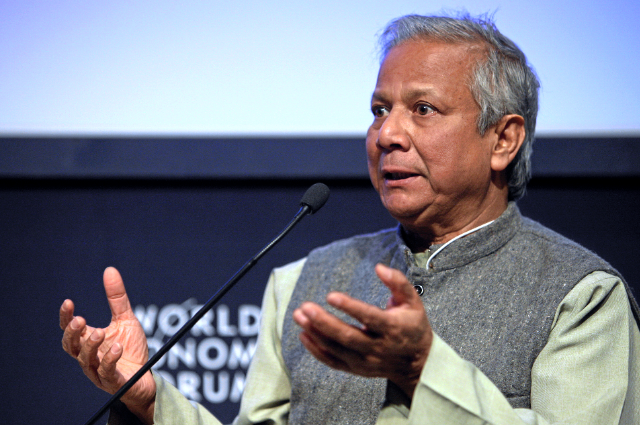In an interview, which Yunus gave before his return to Bangladesh on Thursday, came in the middle reports of continuing unrest and violence in the country, after Sheikh Hasina resigned as prime minister and fled to India in the wake of weeks of tumultuous student protests.
During the meeting, 84-year-old Yunus, who is Bangladesh’s Nobel Peace Prize-Winning Economist and a brutal expert of Hasina, forewarned that India's North-East and West Bengal state, alongside Myanmar, would be impacted on the off chance that Bangladesh became unsteady.
Around the same time as, Yunus meeting the Line Security Power (BSF) said that it had impeded a huge penetration endeavour by an enormous gathering of Bangladeshis along the global boundary in West Bengal. BSF staff allegedly halted around 120-140 Bangladeshi residents who were endeavouring to move over to the Indian side from various areas. The BSF has been "on guard" since the fall of the Hasina government in Dhaka recently.
Answering to a question Yunus said that Bangladesh was confronting instability since there was no rule of peace and law for a long time. As indicated by the Nobel Laureate, the interest for Hasina's abdication as state leader developed further and she had to leave in light of the fact that the rule of peace and law circumstance separated.
Yunus said that the people of Bangladesh are presently observing Hasina's ouster, adding that while the actual festival has made instability, stability will return. As per Yunus, keeping up with the rule of law would be the superb undertaking, which Hasina had neglected to do. Accordingly, he added, her administration separated in the way that it did.
Yunus said that this could not have possibly occurred assuming law and order had been laid out. "What is presently occurring is the continuation of the standard of Hasina. Presently we need to guarantee that people will get back after the festival. They would focus on work. They would work freely, he said.
Bringing up that Bangladesh is a nation of 170 million individuals, the majority of whom are youth and have not had the option to practice their entitlement to cast a vote, Yunus said that the principal task ahead would be to return their rights. Yunus additionally said that Hasina had made individuals of Bangladesh undemocratic by making the nation unstable. We need to remember that majority rule government is the medicine of instability.
Having managed beginning around 2009, Hasina got a fourth successive term in January. In any case, the decisions were boycotted by the principal resistance, the Bangladesh Nationalist Party. Hasina has been blamed for stifling dispute and entrenching power through state organizations. Promising that this time, the people of Bangladesh would enjoy the genuine taste of democracy, Yunus said that they would observer a straightforward political decision, which had been the principal objective of removing Hasina.
Yunus was recommended for the job by the student protesters who led the campaign to remove the former prime minister. When the break government is confirmed, the next step will be fresh elections in Bangladesh. However, it is not known at this time when these polls will be conducted.
Answering one more question on radicalism, Islamic fundamentalism and the breaking of the model of Hasina's dad, Sheik Mujibur Rahman, Yunus said that Hasina herself was responsible for all these incidents. Expressing that Hasina has polluted the picture of Bangladesh's founding father Sheik Mujibur Rahman, Yunus said that the removed prime minister has embittered people so that they are making a such move out of discourtesy.
Yunus likewise said that Bangladesh's minorities would be protected assuming the nation becomes democratic in the genuine sense. The Nobel laureate said that their voice would be thought about, adding that the country's minorities would have the option to vote and choose their representatives, just like minorities in India do.
Yunus' interview came a day after the Indian government in Parliament communicated profound worry over a flood in brutality focusing on minorities in Bangladesh. The brutality saw in Bangladesh has been extreme, with various Hindu sanctuaries, homes, and organizations focused on and vandalized, women assaulted, and at least two Hindu leaders affiliated with Hasina's Awami League killed.
In light of the agitation, all Indian visa application centres in Bangladesh have additionally been closed until further notification. This move follows New Delhi's evacuation of nonessential staff and their families from its High Commission and consulates in Bangladesh.
However, Indian diplomats remain in the country, and the missions continue to function.

